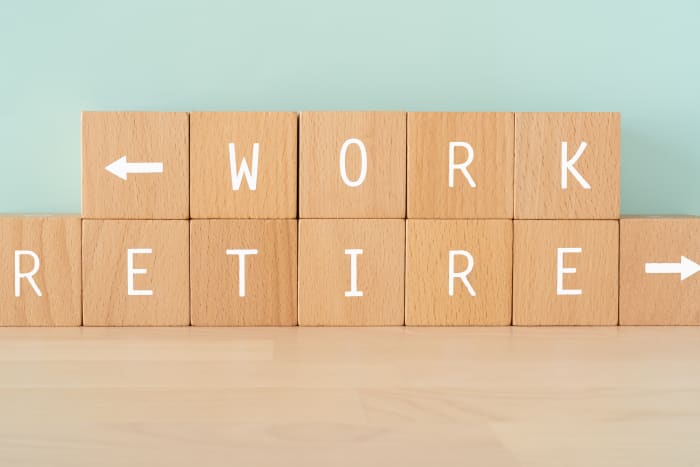One of the faces of the FIRE movement ‘had to’ (gasp) ‘go back to work.’ What does this mean if you want to retire early too?
4 min read
“Daddy had to go back to work because of the 2022 bear market.”
Getty Images/iStockphotoSam Dogen, a personal finance author and financial blogger known as the Financial Samurai, has been a pioneer of the financial independence retire early (FIRE) movement since retiring from his Credit Suisse career at age 34. After banking a reported $3 million over a decade ago, he now writes that he plans to return to work — partly so that he can come up with his kids’ college tuition in the next 12-to-15 years.
“Daddy had to go back to work because of the 2022 bear market. A ~20% decline in the S&P 500 hit our net worth by ~7% in 2022. Both my kids’ 529 plans also got hit almost equally as bad because bonds performed terribly in 2022 as well,” he wrote on his blog. (Looking for a new financial adviser? This tool can match you to an adviser who meets your needs.)
This made us wonder: Who can do FIRE over the long run — and who can’t? We asked a series of pros, and the answer depended a lot on who you asked.
First of all, it may be a problem for some people less from the money perspective and more from a psychological one. “I love the first part — financial independence, but I’m skeptical about the second part — retire early. The assumption is that work absolutely sucks and retirement will be absolutely wonderful,” says certified financial planner Jim Hemphill at TGS Financial. Indeed, a 2022 Spending in Retirement Survey conducted by the Employee Benefit Research Institute revealed that on a scale of 1-to-10, 37% of retirees rated their satisfaction with life in retirement just between a four and seven.
Secondly, most people with kids may also struggle to do this, pros say. “Kids are enormously expensive … As much as I love both of my children, they cost me money in more ways than I can quantify. It’s not realistic to be able to cover soccer, baseball and piano lessons while saving such a substantial portion of your income unless you make a very large salary,” says certified financial planner Joe Favorito at Landmark Wealth Management. Adds Bruce Primeau, certified financial planner at Summit Wealth Advocates: “Extraordinary expenses come with having children. Daycare, sports, school activities, increased cost of medical and dental insurance, increased travel costs and the need for larger vehicles are all examples.”
That said, pros do believe FIRE can last a lifetime for some people, but of course the feasibility of the movement depends in part on one’s income. “Most people can’t possibly pay for essential expenses and still save large percentages such as 25% of their income at such a young age. Most workers reach their peak income closer to their 40s and 50s,” says Favorito.
If you’re committed to the FIRE approach, Hemphill says his biggest economic concern is the 4% distribution rate. “Those numbers are based on back-tested historical simulations and yesterday’s life expectancies. A 40-year old woman retiring today is easily looking at 50 years or more in retirement. What if medicine continues to advance and she lives to age 120? Wealthier people live longer, as do the highly-educated and highly-educated wealthy women live the longest of all,” says Hemphill.
That said, if you do sock enough away, you also need to invest it smartly. In terms of investment strategy, Hemphill says you will absolutely need at least 70% of your money in equities for this to have a shot at working. “No way in the world fixed income can provide the future growth you’ll need to make this work. You’ll need 70% or higher in stock and I think you’ll have a much better chance of it working out if your stock portfolio tilts strongly toward value and foreign stocks,” says Hemphill.
You also need to stay on top of your investments. “As long as you rebalance your portfolio and continue to make contributions toward your retirement goals, I do believe FIRE can be achieved but discipline is the key to that strategy,” says Primeau.
And Favorito notes that it’s important to remember this: “Bad years like this one are less impactful. The average bear market is about a 30% decline, but typically the one year following the decline is about a 43% gain, which gets you back to break even quickly.”
If you do decide this is right for you, Hemphill recommends making sure you have something you absolutely love doing. In Dogen’s case, his new gig plays into his personal interests is a far cry from the world of finance — he’s applied for a job as the video coordinator for the Golden State Warriors, where the lofty basketball season will still afford him several months off. “I need to find a way to get out of the house more often. For six years, so much of my life has evolved around raising young kids. Now that both are in school, I need a new purpose,” says Dogen. (Looking for a new financial adviser? This tool can match you to an adviser who meets your needs.)
Discover more from Slow Travel News
Subscribe to get the latest posts sent to your email.



